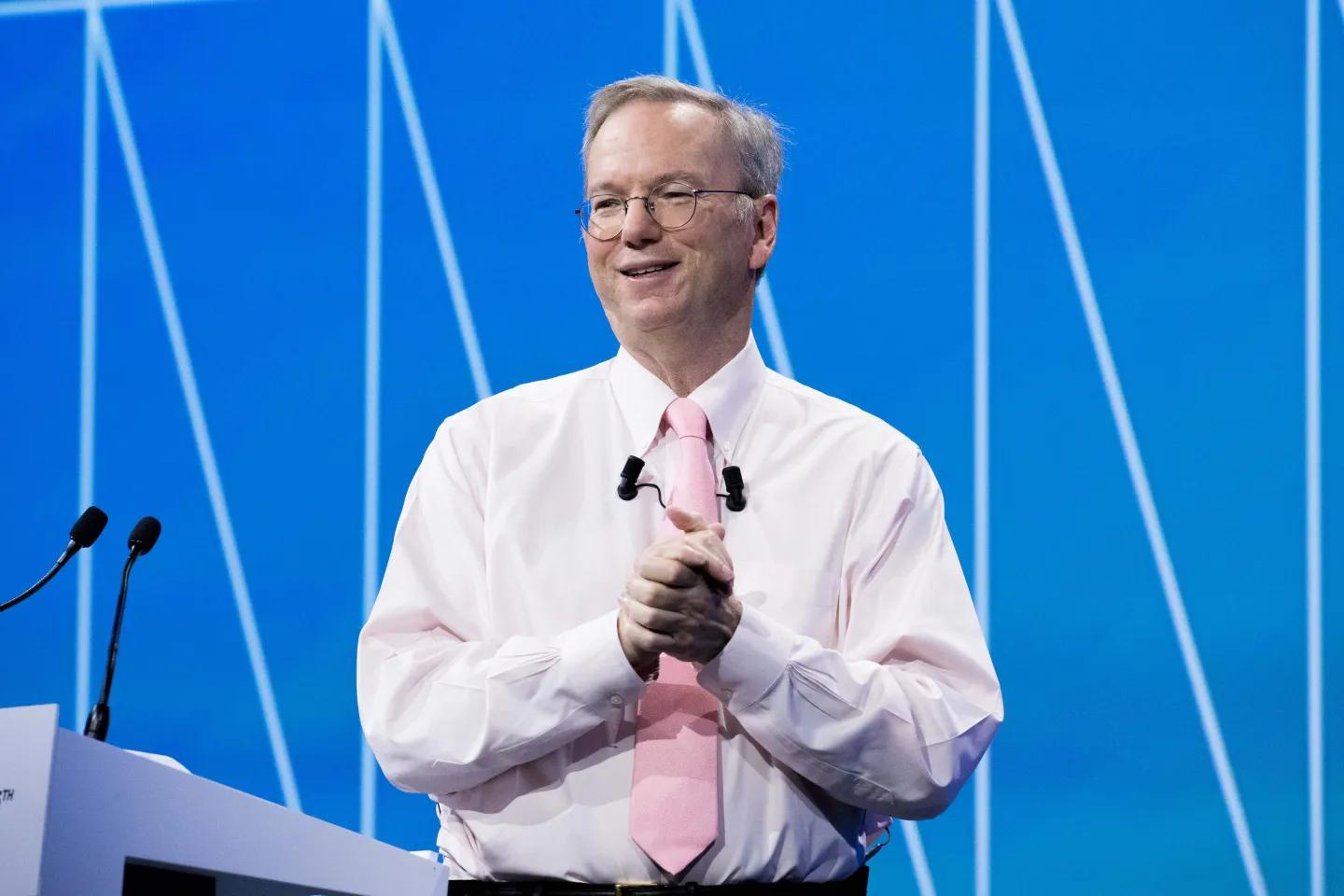
? 硅谷前輩埃里克·施密特表示,當(dāng)AI系統(tǒng)開始自我提升時,,必須有人做好準(zhǔn)備可以將其關(guān)閉,,這樣才能保證它們的安全性。
前谷歌(Google)首席執(zhí)行官埃里克·施密特警告稱,,AI系統(tǒng)可能需要有一個緊急關(guān)機裝置,,以免它們變得過于強大。施密特認為,,隨著AI系統(tǒng)的自動化程度越來越高,,它們可能給人類帶來全新的、更嚴(yán)重的威脅,。
施密特周日在接受ABC News采訪時表示:“最終你會對電腦說:‘學(xué)習(xí)所有知識,,完成一切任務(wù)’。這是一個危險的臨界點,。當(dāng)AI系統(tǒng)可以自我提升時,,我們就需要認真考慮關(guān)掉它,?!?/p>
施密特預(yù)測,AI將從任務(wù)型助理,,如微軟(Microsoft)的Copilot,,進化成可以自主決策的更加復(fù)雜的系統(tǒng)。施密特認為,,當(dāng)AI達到這個階段時,,人類就應(yīng)該介入,,并考慮關(guān)閉系統(tǒng)。人類需要確保在需要關(guān)閉AI系統(tǒng)時,,不會遭到它的抵抗,。
施密特說道:“理論上,最好有人可以隨時將其關(guān)閉,?!?/p>
施密特在硅谷工作了數(shù)十年。2001年,,谷歌創(chuàng)始人謝爾蓋·布林和拉里·佩奇將他招入麾下,,幫助拓展他們的業(yè)務(wù)規(guī)模。當(dāng)時,,布林和佩奇認為他們需要一位具有高管經(jīng)驗的穩(wěn)重人物來管理公司,,而他們自己則專注于技術(shù)研發(fā)。在他的職業(yè)生涯中,,施密特見證了科技行業(yè)的多次創(chuàng)新浪潮,。施密特對最壞情況的擔(dān)憂,也得到了其他AI領(lǐng)域知名人士的認同,。
諾貝爾獎得主杰弗里·辛頓在2023年表示,,他“看不到一條保證安全的路徑”,因為人工智能可以自行思考,。辛頓憑借他的發(fā)現(xiàn)被譽為“AI教父”,。OpenAI首席執(zhí)行官薩姆·奧爾特曼表示,通用人工智能最糟糕的情況是“人類徹底滅亡”,。OpenAI的聯(lián)合創(chuàng)始人,、現(xiàn)已成為競爭對手的埃隆·馬斯克警告說,人工智能可能對人類文明造成毀滅性影響,。
馬斯克在10月份表示,,人工智能“很可能會很棒,但也有10%到20%的可能性會變得很可怕,,這并非毫無可能,。”
施密特也強調(diào)了AI積極的方面,。
施密特對ABC的喬治·斯特凡諾普洛斯表示:“重要的是,,人工智能的力量意味著每個人都會隨身攜帶一個相當(dāng)于‘全才’的助手。除了你的筆記和撰稿人,,還會有愛因斯坦和達芬奇來為你的節(jié)目提供建議,。這對地球上的每個人來說都是如此。”
為了確保人類在不遭受重大損害的情況下獲得這些好處,,施密特認為政府必須開始對AI進行監(jiān)管,。施密特提到他與已故的亨利·基辛格曾討論過這個話題,并與他合著了《創(chuàng)世紀(jì):人工智能,、希望與人類精神》(Genesis: Artificial Intelligence, Hope, and the Human Spirit)一書,。
施密特表示:“政府應(yīng)該發(fā)揮作用?;粮癫┦糠浅娏业卣J為,,人工智能的未來不應(yīng)該由像我這樣的人來決定,也不應(yīng)該只由技術(shù)人員來決定,?!?/p>
到目前為止,美國尚未在聯(lián)邦層面實施任何AI監(jiān)管,。然而,,加利福尼亞州提出了一系列保護電影行業(yè)的AI法案,并打擊了使用該技術(shù)制作的深度偽造視頻,。但加州州長加文·紐瑟姆否決了一項名為SB 1047的綜合性法案,,該法案因?qū)﹂_發(fā)人員的嚴(yán)格報告要求而遭到風(fēng)險投資者和科技公司高管的強烈反對。(財富中文網(wǎng))
譯者:劉進龍
審校:汪皓
谷歌前董事長兼首席執(zhí)行官埃里克·施密特,。CHRISTOPHE MORIN—IP3/GETTY IMAGES
? 硅谷前輩埃里克·施密特表示,,當(dāng)AI系統(tǒng)開始自我提升時,必須有人做好準(zhǔn)備可以將其關(guān)閉,,這樣才能保證它們的安全性,。
前谷歌(Google)首席執(zhí)行官埃里克·施密特警告稱,AI系統(tǒng)可能需要有一個緊急關(guān)機裝置,,以免它們變得過于強大,。施密特認為,隨著AI系統(tǒng)的自動化程度越來越高,,它們可能給人類帶來全新的,、更嚴(yán)重的威脅。
施密特周日在接受ABC News采訪時表示:“最終你會對電腦說:‘學(xué)習(xí)所有知識,,完成一切任務(wù)’,。這是一個危險的臨界點。當(dāng)AI系統(tǒng)可以自我提升時,,我們就需要認真考慮關(guān)掉它,。”
施密特預(yù)測,,AI將從任務(wù)型助理,,如微軟(Microsoft)的Copilot,,進化成可以自主決策的更加復(fù)雜的系統(tǒng),。施密特認為,,當(dāng)AI達到這個階段時,人類就應(yīng)該介入,,并考慮關(guān)閉系統(tǒng),。人類需要確保在需要關(guān)閉AI系統(tǒng)時,不會遭到它的抵抗,。
施密特說道:“理論上,,最好有人可以隨時將其關(guān)閉?!?/p>
施密特在硅谷工作了數(shù)十年,。2001年,谷歌創(chuàng)始人謝爾蓋·布林和拉里·佩奇將他招入麾下,,幫助拓展他們的業(yè)務(wù)規(guī)模,。當(dāng)時,布林和佩奇認為他們需要一位具有高管經(jīng)驗的穩(wěn)重人物來管理公司,,而他們自己則專注于技術(shù)研發(fā),。在他的職業(yè)生涯中,施密特見證了科技行業(yè)的多次創(chuàng)新浪潮,。施密特對最壞情況的擔(dān)憂,,也得到了其他AI領(lǐng)域知名人士的認同。
諾貝爾獎得主杰弗里·辛頓在2023年表示,,他“看不到一條保證安全的路徑”,,因為人工智能可以自行思考。辛頓憑借他的發(fā)現(xiàn)被譽為“AI教父”,。OpenAI首席執(zhí)行官薩姆·奧爾特曼表示,,通用人工智能最糟糕的情況是“人類徹底滅亡”。OpenAI的聯(lián)合創(chuàng)始人、現(xiàn)已成為競爭對手的埃隆·馬斯克警告說,,人工智能可能對人類文明造成毀滅性影響,。
馬斯克在10月份表示,人工智能“很可能會很棒,,但也有10%到20%的可能性會變得很可怕,這并非毫無可能,?!?/p>
施密特也強調(diào)了AI積極的方面。
施密特對ABC的喬治·斯特凡諾普洛斯表示:“重要的是,,人工智能的力量意味著每個人都會隨身攜帶一個相當(dāng)于‘全才’的助手,。除了你的筆記和撰稿人,,還會有愛因斯坦和達芬奇來為你的節(jié)目提供建議。這對地球上的每個人來說都是如此,?!?/p>
為了確保人類在不遭受重大損害的情況下獲得這些好處,施密特認為政府必須開始對AI進行監(jiān)管,。施密特提到他與已故的亨利·基辛格曾討論過這個話題,,并與他合著了《創(chuàng)世紀(jì):人工智能、希望與人類精神》(Genesis: Artificial Intelligence, Hope, and the Human Spirit)一書,。
施密特表示:“政府應(yīng)該發(fā)揮作用,。基辛格博士非常強烈地認為,,人工智能的未來不應(yīng)該由像我這樣的人來決定,,也不應(yīng)該只由技術(shù)人員來決定?!?/p>
到目前為止,,美國尚未在聯(lián)邦層面實施任何AI監(jiān)管。然而,,加利福尼亞州提出了一系列保護電影行業(yè)的AI法案,,并打擊了使用該技術(shù)制作的深度偽造視頻。但加州州長加文·紐瑟姆否決了一項名為SB 1047的綜合性法案,,該法案因?qū)﹂_發(fā)人員的嚴(yán)格報告要求而遭到風(fēng)險投資者和科技公司高管的強烈反對,。(財富中文網(wǎng))
譯者:劉進龍
審校:汪皓
? Once AI systems start to self-improve their capabilities, ensuring they remain safe will require someone who is ready and able to shut them down, according to Silicon Valley veteran Eric Schmidt.
Former Google CEO Eric Schmidt cautioned that AI systems might need a kill switch if they get too powerful. As the systems become increasingly autonomous, they could present new and graver threats to humanity, according to Schmidt.
“Eventually you say to the computer, ‘Learn everything and do everything,’” Schmidt said Sunday in an interview with ABC News. “And that’s a dangerous point. When the system can self-improve, we need to seriously think about unplugging it.”
Schmidt predicted that AI will advance from the sort of task-specific agents like Microsoft Copilot, to more complex systems that can make decisions on their own. When AI reaches that stage, it will be time for humans to step in and consider turning off the system, said Schmidt. Humans need to ensure that the AI itself can’t counteract efforts to shut it down.
“In theory, we better have somebody with the hand on the plug, metaphorically,” Schmidt said.
Schmidt worked in Silicon Valley for decades. In 2001, Google founders Sergey Brin and Larry Page brought him in to help scale their business. At the time, Brin and Page felt they needed a steady hand with high-profile executive experience to shepherd their company, while they dedicated themselves to research and development. Over his career, Schmidt had a front-row seat to the tech industry’s many waves of innovation. Schmidt’s fears about this worst-case scenario are shared by other AI luminaries.
Nobel laureate Geoffrey Hinton, whose discoveries earned him the moniker “the Godfather of AI,” said in 2023 he “couldn’t see a path that guaranteed safety” because AI could think for itself. OpenAI CEO Sam Altman said the worst-case scenario of artificial general intelligence is “l(fā)ights out for all of us.” Elon Musk, an OpenAI cofounder turned rival, warned AI could lead to the destruction of civilization.
AI is “most likely going to be great,” Musk said in October. “There’s this sub chance, that could be 10% to 20%, that it goes bad. The chances aren’t zero that it goes bad.”
Schmidt, too, highlighted the positives of AI.
“The important thing is that the power of this intelligence means that each and every person is going to have the equivalent of a polymath in their pocket,” Schmidt told ABC’s George Stephanopoulos. “In addition to your notes and writers, you’re going to have an Einstein and a Leonardo da Vinci to give you advice on your show. That will be true for everyone on the planet.”
To ensure mankind reaps those benefits without incurring significant damages, Schmidt believes governments will have to start regulating AI. Schmidt referenced conversations on the topic he’d had with the late Henry Kissinger, with whom he cowrote Genesis: Artificial Intelligence, Hope, and the Human Spirit.
“Government has a role,” Schmidt said. “Dr. Kissinger felt very strongly that the future of intelligence should not be left to people like me. The technologists should not be the only ones making these decisions.”
So far, the U.S. has not implemented any AI regulation at the federal level. However, California put forth a series of AI bills to protect the film industry and cracked down on deepfakes made using the technology. But California Gov. Gavin Newsom vetoed a comprehensive bill known as SB 1047 that venture capital and tech executives heavily opposed owing to the stringent reporting requirements it would have imposed on developers.






